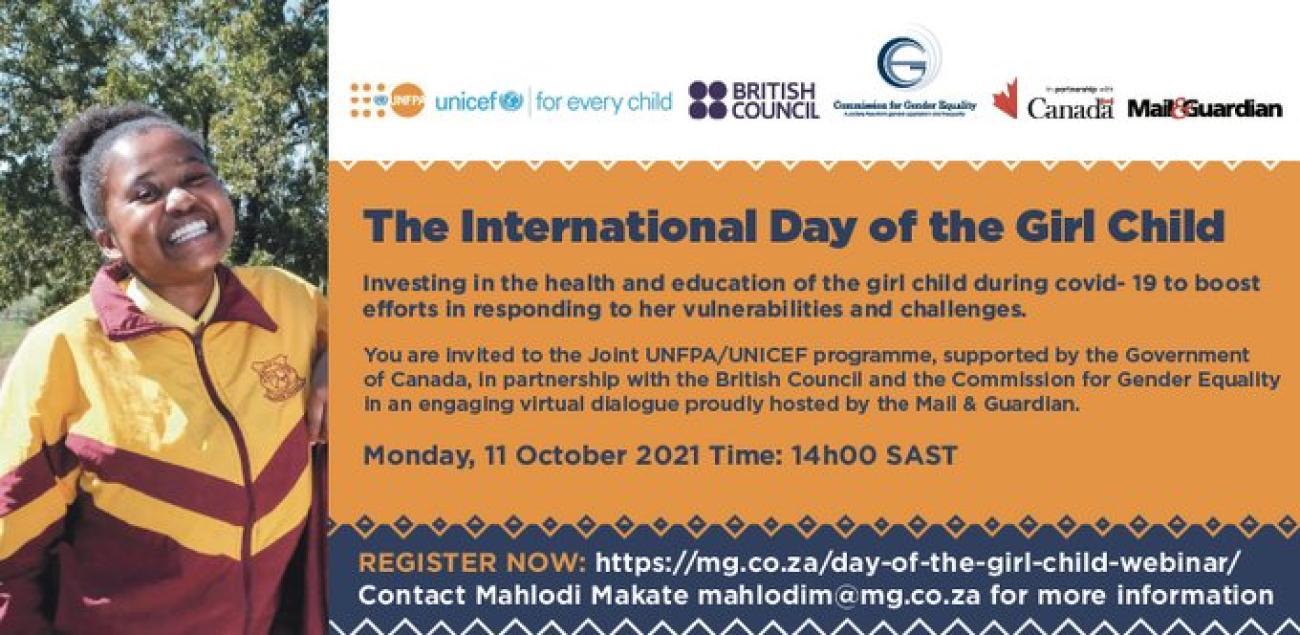Every 11 October marks the International Day of the Girl Child. This year’s day was celebrated under the theme, “Digital generation, our generation”. To commemorate this all-important day, the UN Population Fund (UNFPA) and the UN Children’s Fund (UNICEF), supported by the Government of Canada, in partnership with the British Council and the Commission for Gender Equality (CGE), held a live webinar hosted by the Mail & Guardian newspaper.
The webinar, titled: “Investing in the health and education of the girl child during Covid-19”, sought to highlight the multiple challenges faced by the girl child. Girls and young women are the drivers of sustainable development and powerful agents of change. Evidence from around the world confirms that investing in girls and young women creates a ripple effect that yields multiple benefits, not only for individual women, but for families, communities and countries alike.
Yet, noted the then UNFPA Officer-in-Charge, Dr. Agathe Lawson, despite all that is known too many girls and young women are still held back by social norms and affected negatively by harmful cultural practices influencing their educational rights and opportunities. They are deprived of access to health services, confront barriers to education, are vulnerable to gender-based violence, and face discrimination in political, legal and economic sphere, added Dr. Lawson in her opening remarks at the webinar.
Youth advocate and the webinar moderator, Yolokazi Mfuto, noted that the outbreak of the Covid-19 pandemic had negatively affected years of progress made towards gender equality. Girl children were always at the receiving end of violence and deprivation, and there were seldom days set aside or platforms created to celebrate them.
Discussing critical barriers to girls’ education, Caroline Grant, the Senior Adviser on English for Education Systems and Schools Lead at the British Council, talked about teacher attitudes, practices and differential expectations of boys and girls in the classroom, including gaps in skills and knowledge for teachers in gender-sensitive pedagogy.
Sharing findings from the five recent countries surveyed in the Connecting Classrooms for Global Learning (CCGL) Education Resilience research, she noted that teachers and school leaders reported increases in incidents of abuse and exploitation, both within and outside the home. The research showed that any improvement in education for girls requires disciplined data and a sense of context, acknowledging that all stakeholders must be involved, from teachers to parents and communities.
The Chairperson of the Commission for Gender Equality, Tamara Mathebula, highlighted how Covid-19 and school closures have led to increases in adolescent pregnancy due to challenges in accessing services on mental health, sexual and reproductive health and rights (SRHR), HIV, and gender-based violence. She emphasized the need to invest in SRHR, noting that this would ensure that digital technologies open new opportunities in giving voices to girls, particularly those from remote locations. She told participants the Commission pays particular attention to access to education on SRH issues and that the explosion of teenage pregnancy in South Africa during Covid-19 requires systematic plans to create the necessary changes.
Discussing some of the programme interventions from the joint UNFPA/UNICEF programme, Sarah Reis, a UNFPA Gender Specialist, noted that the programme was supporting those who are left furthest behind, which are mainly young women and girls. According to Ms. Reis, this support was provided to social services to assist communities to improve their health and reduce GBV.
Health services may be the only services available in remote rural areas. They are often not only a critical entry point to referrals to other social services, but are also often connections between service providers, and this can improve SRHR outcomes, she noted. She also added that there was often a stigma and limited knowledge about accessing services, and that was what the joint programme was addressing.
A survey on knowledge, attitudes and behaviour conducted by the joint UNFPA/UNICEF programme found that the definition of sexual reproduction and health differed among young people, especially between the rural and urban youth, according to Ms. Lebogang Schultz, the HIV Specialist at UNICEF. Rural youth were more reserved and linked it to family health. She told the webinar that concerted efforts need to go into investing in adolescent health services and that healthcare workers at these clinics must be trained on how to handle young people’s sexual issues — without judgement.
Panellists called for efforts to strengthen partnerships and increase investments in the health and education of the girl child to address her vulnerabilities in the midst of the Covid-19 pandemic.
“Young girls in rural areas suffer the most, and more effort must be made to reach them,” said Dr. Lawson in her concluding remarks, expressing the hope that some of the issues raised would be taken up in other platforms. She also called for the inclusion of boys so that they learn to treat girls with greater respect.











